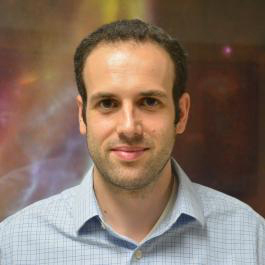EVANSTON - Northwestern University astrophysicist Claude-André Faucher-Giguère, an expert in galaxy formation, has received a Faculty Early Career Development Program (CAREER) award from the National Science Foundation (NSF). The foundation’s most prestigious honor for junior faculty members supports both research and education initiatives.

Faucher-Giguère focuses on understanding how galaxies observed today formed from the Big Bang. This complex area of research ties together several different astrophysical phenomena, including how stars and black holes formed in galaxies.
“Our new simulations will greatly improve the predictive power of galaxy formation models,” Faucher-Giguère said. “We will be able to connect directly to observations by new state-of-the-art observatories, such as the powerful ALMA radio telescope and the James Webb Space Telescope, scheduled for launch by NASA next year.”
Faucher-Giguère is an assistant professor of physics and astronomy in the Weinberg College of Arts and Sciences and a member of Northwestern’s Center for Interdisciplinary Exploration and Research in Astrophysics (CIERA).
The CAREER award supports early career development of individuals who exemplify the role of teacher-scholar through outstanding research, excellent education and the integration of education and research.
“I am very honored to have been selected for this award and its generous support,” Faucher-Giguère said. “An important aspect of the CAREER award is that it provides support for five years, rather than the three years more typical of federal grants. This longer-term support will enable us to undertake more challenging projects with higher potential impact than we could complete in a regular three-year funding cycle.”
Faucher-Giguère and his research group develop sophisticated numerical simulations that follow galaxy formation from the beginning to present time. The simulations produce extremely rich data sets. To test their models, the researchers compare the data with observations from a large array of telescopes on the ground and in space, such as the Hubble Space Telescope.
The NSF CAREER award will enable Faucher-Giguère to develop the next generation of galaxy formation simulations by developing new and more accurate models for “stellar feedback” and how it regulates star formation in galaxies. Stellar feedback refers to energy output by processes like supernova explosions following the death of stars; it strongly affects galaxy evolution and is key to explaining the properties of observed galaxies.
The CAREER award will support an integrated education and outreach program, including developing new interactive visualizations of the research group’s galaxy simulations. Faucher-Giguère will bring these visualizations to the public via several partnerships, including with the Adler Planetarium in Chicago.
The award also will provide summer research opportunities for undergraduate students who will gain experience in computational astrophysics. Students will not only learn about astrophysics but also develop broadly applicable computational and data analysis skills.

